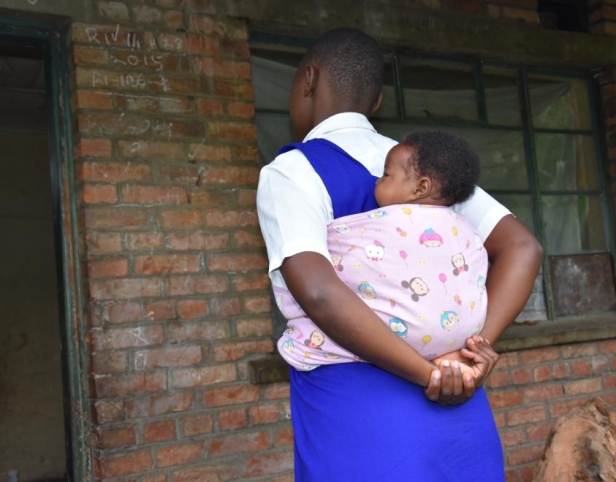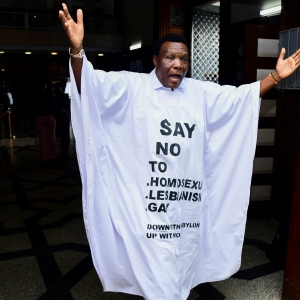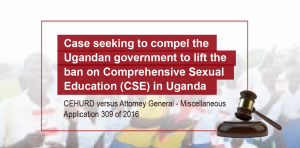
Prior to the release of this documentary the nation was ablaze with discourse around the degeneration of morals and the need to stomp out what was referred to as the “gay agenda” enough to whip up the Anti-Homosexuality Bill 2023 calling for the death penalty of LGBTQ persons. The Bill confirms an already existing punishment of life imprisonment for same-sex conduct, while also increasing to 10 years the prison sentence for an attempt at same-sex conduct. The bill also outlaws the “promotion of homosexuality,” effectively instituting a system of complete censorship on LGBT issues. Anyone advocating for the rights of LGBT people, or providing financial support to organizations that do so, could face up to 20 years’ imprisonment. LGBT rights groups could also be deemed unable to legally operate. In addition, anyone who “advertises, publishes, prints, broadcasts, distributes” material, including digitally, is regarded as “promoting or encouraging homosexuality” and would face criminal sanction.”

It goes without saying that the documentary did not elicit an uproar in parliament resulting into hard lining bills to protect women and girls because in our nation, culture and even households, there is a normalisation of male perpetrated sexual violence against women and girls. Sexual violence against children, women and girls is so prevalent that increasing incidences and statistics showing violence is received with the same nonchalance as a weather broadcast. During the Covid19 pandemic, the United Nations Population Fund revealed that a total of 354,736 teenage pregnancies were registered in 2020, and 196,499 in the first six months of 2021.
This collective nonchalance towards SGBV can be explained in the paper titled “Rethinking Gender and Violence, 2010, Jane Bennet highlights that, “The discourse is problematic precisely because it fails to problematise the normalisation of violence against femininity, deeming such violence attention-worthy only when it is has a high incidence and is widespread. Without addressing the systems – political, social, cultural, legal, economic – through which sexual violence is feminised and disseminated as an inevitable part of social relations, the intense concentration of efforts on dealing with the problem when it is at a peak will not succeed in addressing the root that gives rise to the problem.”
Indeed from time to time, there is a weak explosion of discourse, and a lone voice in decision making rooms around the plight of young women and girls, but it is never enough to bring a sustained investigation and national commitment towards grasping this problem at its many roots.
When analysing the problem of rape, as a people we are given to old patterns, we turn our noses away from our patriarchal cultures and religions that established women’s bodies ;-
? as beasts of burden and beasts of pleasure
?as battlegrounds for political fights
?scape goats for broken governance and leadership
When there is a recognition of the problem against women and girls, it is either ignored, sensationalised or misdiagnosed and thus given wrong remedies. There is a refusal to acknowledge the problems afoot because of how much it registers most of us as accomplices in the problem of sexual violence either complicitly silent or as active perpetrators. In tracing the
What is even more disturbing is that we are actively sabotaging any activist efforts around SGBV through our moves like demonising concepts like Sexual and Reproductive Health and Rights where the term, “Rights” is currently being erased to the extent that CSOs and grassroots activists for SRHR face the risk of not being licenced if their programmes feature this term.
Yet if we erase the concept, “Rights” from our language and practice, upon which grounds can we advocate for the rights of those who are perpetually marginalised and oppressed?
As a nation we are also being swayed by religious fundamentalist groups calling for the erasure of Comprehensive Sexual and Reproductive Health and Rights Education for young people, the rejection of the #EACSRHRBill and the rejection of access to safe medical abortion while our hospitals brim with young survivors and victims of sexual violence. These fundamentalist groups that feel that a promotion of body autonomy and self determination for all persons is a threat to their agenda of control from which they profit immensely, have taken to the spread of propaganda and the stimulation of moral panic through misinformation and fear mongering.

The fault lines within our approaches to SRHR grow deeper and the consequences grow more dire as we take on cosmetic and unsustainable solutions like policing of women and girls bodies in their diversities. The high rate of SGBV, the increasing rate of teenage pregnancies, the lives lost to unsafe abortions and so much more are an indication that we need to re-strategise and this is what we should do.
Firstly, we need to respond to learn again to address the problem with the emotions that it is due, because we should resist becoming jaded and numb to these issues as this leads to inactiveness around the issue. Like feminist author Audre Lorde says, we must stay angry and channel our anger to action.
Then we must respond systematically to the problem of male perpetrated violence against women and girls by confronting loudly and honestly the patriarchal structures within our culture and religion that uphold, romanticise and perpetrate it.
We must address and dismantle the problematic power dynamics within our interpersonal relationships and filter into culture and systems which follow the dynamic of the dominant and subjugation structure. This power dynamic is a breeding ground for abuse and violation of individual rights resulting into an oppressed class whether it involves children, women, people living in poverty, people with disabilities etc. It is only through understanding how hetero-patriarchal power dynamics reinforce violence that we will be able to
We must actively address the culture of silence around SGBV that becomes a safe den of abusers and creates impunity by not only speaking out against SGBV and identifying perpetrators but also by changing the way, we speak about SGBV and treat those who speak out in and out of media. The inclination towards protecting abusers because they have socially sanctioned authority and resources must stop. The shaming and blaming of victims of SGBV through using their behaviour as a justification or vindication of their abuse must stop.
When it comes to Justice, we need to identify and address the systemic barriers in our justice systems that get in the way of delivering justice to victims and survivors. Why should a victim for instance have to dish out money to pay for the meals of their abuser while in police custody. With a faulty justice system, we will reinforce impunity that leads to aggravated abuse.
It is also important to champion for the increase of funding towards SRHR in our national budgets so as to better support women & girls and lastly we need to read feminist theory around Sexual and Gender Based Violence so as to continuosly examine and improve our response to the issue of SGBV.
Here are some good feminist reads on SGBV:
An Intersectional Feminist Analysis Of The SRHR Legal and Policy Framework In Uganda
Keep your hands of my thighs Ssebo


The documentary revealed that the increase in sexual violence perpetrated by men against young girls is responsible for 23 % of pregnancies in the Northern region of Uganda, with the perpetrators being male family members of the children. In many of these cases, the documentary also reveals that the pursuit of justice for survivors/victims is complicated further by the fact means that victims and their families have to pay out of pocket for the fuel that the police car uses to arrest the rapist and even buying the food that the rapist eats, while in jail.